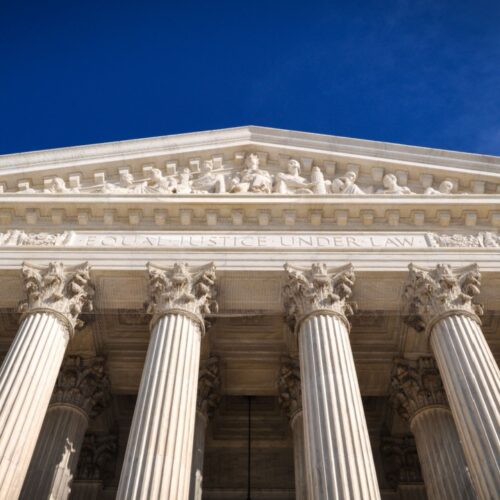Trump’s Conviction Is Doubly Abusive

Editor’s Note: In our founders’ time, it was common for those disfavored by the regime—especially high-ranking or ambitious politicians—to be deprived of their rights and their place in public affairs, without trial or recourse, by acts of the legislature known as “bills of attainder.” Our founders were so cautious of this particular form of treachery that they banned the practice not just in the U.S. Constitution but in every single one of the original state constitutions.
What the founders didn’t foresee, argues attorney Deion Kathawa, is the current predicament in which such abuses—like so much legislative business—would be absorbed by the other branches and carried out by political prosecutors in front of political judges. Donald Trump’s conviction serves the exact same purpose as these bills of attainder once did. That it is wrapped up in the creeping rule of the administrative state makes it doubly objectionable. The result, Kathawa argues, is a totalitarian threat somewhere between a Soviet show trial and a regression to the overreach that forced our revolution.
Last year, Manhattan District Attorney Alvin Bragg filed in New York state court the so-called hush money case against Donald J. Trump. In brief, Trump was found “guilty” of making a $130,000 payment in the final weeks of the 2016 presidential race—via his former lawyer Michael Cohen (who himself pleaded guilty in 2018 to what the judge overseeing his case described as a “veritable smorgasbord of fraudulent conduct”)—to buy the silence of porn actress “Stormy Daniels,” who claimed that she and Trump had sex, all in an effort to interfere in the election, according to the prosecution.
For those who are understandably confused about the exact nature of Trump’s wrongdoing given that, in civil litigation, settlements paired with nondisclosure agreements are quite common, the supposed illegality is that when Cohen was reimbursed, the payments were recorded as legal expenses, which prosecutors contended was an unlawful attempt to mask the true purpose of the Trump-Daniels transaction—to influence the 2016 election.
In any event, on Thursday, May 30, 2024, a mere five months from the 2024 election, a jury, after a little more than nine hours of deliberations, found Trump guilty of every single one of the 34 charges DA Bragg brought against him. Consequently, the Associated Press reports that Trump “became the first former American president to be convicted of felony crimes.” As Kenin M. Spivak has noted in The American Mind, the proceedings are riddled with more than a dozen reversible errors. Nonetheless, Trump is set to be sentenced on July 11, by the judge who oversaw the trial, Juan Merchan—just four days before the start of the Republican National Convention in Milwaukee.
Of note with respect to Judge Merchan’s rather dubious impartiality, his daughter, Loren Merchan, is the president of Authentic Campaigns—a group that represents Democrat politicians and political action committees and which has collected at least $70 million in payments from Democrat candidates and causes since she helped found the company in 2018.
To say this result is unprecedented is an understatement, and to observe that it poses a serious threat to the continued viability of the American experiment—the “American way of life”—is putting it exceedingly mildly. The Left’s diligent lawfare campaign—the tyrannical use of the legal system to target political opponents for destruction and to subvert the ordinary operations of civil society—has reached a high-water mark with Trump’s conviction.
The country will never again be the same.
The jury’s verdict provides an occasion to take a few steps back to examine the state of the rule of law in light of first principles of justice. To put it bluntly: Our predicament is grim. Yet, the founders’ critical attitude toward a little-remembered form of lawfare in their own time could prove to be instructive in our present crisis..
Bills of attainder “occur where the legislature labels a person or group as a wrongdoer and takes their property, liberty, or both without due process.” The United States Constitution prohibits their use both by Congress (Article I, Section 9) and states legislatures (Article I, Section 10). In Federalist No. 44, James Madison directly discussed the dangers of bills of attainder, ex-post-facto laws, and laws impairing the obligation of contracts, which he warned “are contrary to the first principles of the social compact, and to every principle of sound legislation.”
One scholar, Duane Ostler, has explained that bills of attainder “were extensively used”—and abused—“by all the states during the American Revolution to fund the war effort” and that the “constitutional ban on bills of attainder was a prohibition of arbitrary takings.”
Looking further back:
In old England, bills of attainder were most often used by Parliament to get rid of undesired high officials. By way of the bill of attainder, Parliament would condemn the attainted individual to death and cut off all his inheritance. A legislative bill calling for a loss of liberty or property, but not the life of the named person, was known as a bill of pains and penalties. If the person’s life was called for, then it was a true bill of attainder. However, bills of pains and penalties and of attainder were commonly lumped together, and the reference in the Constitution to a bill of attainder was generally understood to include the bill of pains and penalties as well.
Both Hamilton and Madison were of the view that bills of attainder “could be interpreted more broadly to include any targeting for disparate treatment of a person or persons labeled by the legislature as wrongdoers.” As evidenced by the constitutional text, the founders’ assumption was that bills of attainder targeting the innocent would come from legislatures, and they were especially worried about abuses by the states.
They never in their wildest imaginations conceived of our present-day predicament: that bills-of-attainder-esque usurpations of due process would emanate from the executive branch, as when politicized prosecutors like DA Bragg engage in jury shopping, of which Trump is a victim. (He was tried in deep-blue Manhattan, a city that Biden won in the 2020 election by a landslide, with 84.5 percent of the vote to Trump’s meager 14.5 percent.)
That said, we should not be surprised by this modern innovation. A bill of attainder is most certainly best understood as a peculiarly legislative act—but so is making law. As Justice Clarence Thomas noted in his concurring opinion in Whitman v. American Trucking Associations, Inc. (2001), “the Constitution does not speak of ‘intelligible principles.’ Rather, it speaks in much simpler terms: ‘All legislative Powers herein granted shall be vested in a Congress.’ U. S. Const., Art. 1, § 1 (emphasis added).” But that constitutional text has not stopped the steady erosion of congressional power. Ever since the Progressive Era, quintessentially legislative powers have been arrogated by ambitious bureaucrats and judges.
DA Bragg’s indictment embodies the infamous Soviet adage, attributed to Lavrentiy Beria, Joseph Stalin’s secret police chief: “Show me the man, and I’ll find you the crime.” Trump was targeted for prosecutorial persecution by a left-wing district attorney because that activity boosts the Democrats’ electoral prospects in November; the details, such as they are, were filled in later. Indeed, a journalist who recently appeared on Piers Morgan Uncensored, whose job it is to explain the case’s developments to a lay audience, was utterly incapable of identifying precisely what crime(s) Trump committed to warrant his conviction.
It would be hilarious if it weren’t so corrosive to the rule of law and the country’s long-term health.
Deion A. Kathawa is an attorney who hails from America’s heartland. He holds a J.D. from the University of Notre Dame and a B.A. from the University of Michigan-Ann Arbor. He is a 2021 alumnus of the Claremont Institute’s John Marshall Fellowship. Subscribe to his “Sed Kontra” newsletter on Substack.



